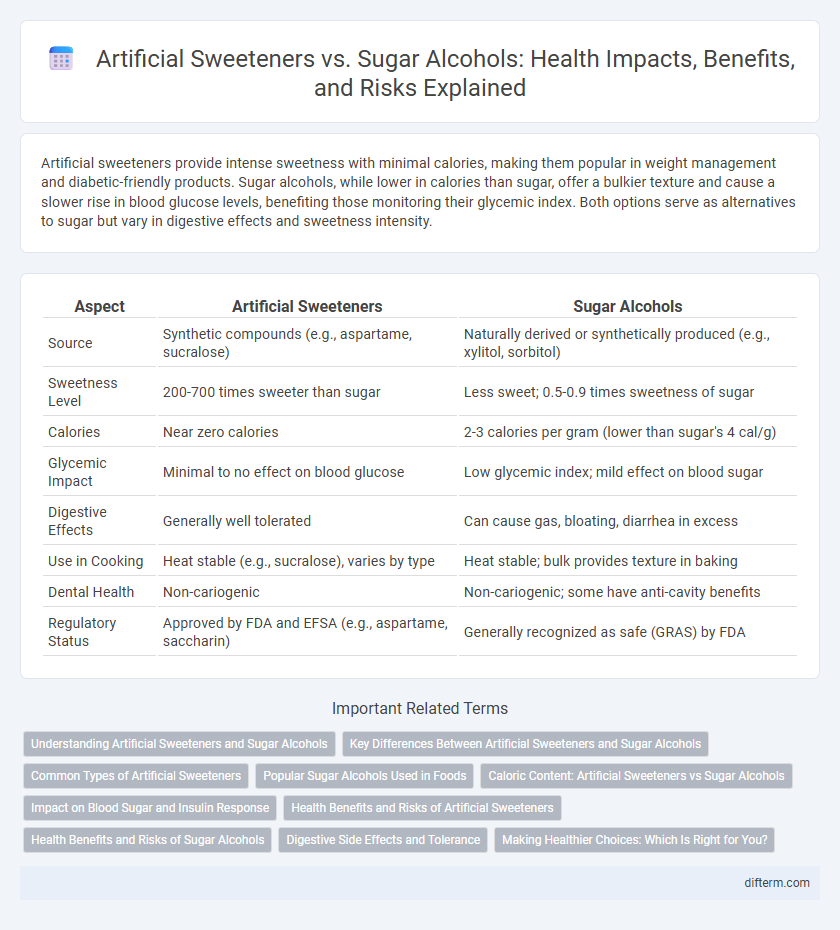Artificial sweeteners provide intense sweetness with minimal calories, making them popular in weight management and diabetic-friendly products. Sugar alcohols, while lower in calories than sugar, offer a bulkier texture and cause a slower rise in blood glucose levels, benefiting those monitoring their glycemic index. Both options serve as alternatives to sugar but vary in digestive effects and sweetness intensity.
Table of Comparison
| Aspect | Artificial Sweeteners | Sugar Alcohols |
|---|---|---|
| Source | Synthetic compounds (e.g., aspartame, sucralose) | Naturally derived or synthetically produced (e.g., xylitol, sorbitol) |
| Sweetness Level | 200-700 times sweeter than sugar | Less sweet; 0.5-0.9 times sweetness of sugar |
| Calories | Near zero calories | 2-3 calories per gram (lower than sugar's 4 cal/g) |
| Glycemic Impact | Minimal to no effect on blood glucose | Low glycemic index; mild effect on blood sugar |
| Digestive Effects | Generally well tolerated | Can cause gas, bloating, diarrhea in excess |
| Use in Cooking | Heat stable (e.g., sucralose), varies by type | Heat stable; bulk provides texture in baking |
| Dental Health | Non-cariogenic | Non-cariogenic; some have anti-cavity benefits |
| Regulatory Status | Approved by FDA and EFSA (e.g., aspartame, saccharin) | Generally recognized as safe (GRAS) by FDA |
Understanding Artificial Sweeteners and Sugar Alcohols
Artificial sweeteners, such as aspartame, sucralose, and saccharin, provide intense sweetness without adding calories, making them popular in weight management and diabetes control. Sugar alcohols, including xylitol, sorbitol, and erythritol, offer lower-calorie alternatives that partially metabolize, resulting in a reduced glycemic impact compared to regular sugar. Both substances impact blood sugar levels differently and have distinct digestive effects, requiring careful consideration for individual health goals.
Key Differences Between Artificial Sweeteners and Sugar Alcohols
Artificial sweeteners, such as aspartame and sucralose, are synthetic compounds that provide intense sweetness with negligible calories, while sugar alcohols like xylitol and erythritol are naturally derived from sugars and offer fewer calories than sugar but can cause digestive discomfort in large amounts. Unlike sugar alcohols, artificial sweeteners do not affect blood sugar levels, making them suitable for diabetic dietary management. Sugar alcohols partially metabolize in the body, contributing to lower glycemic impact and moderate calorie content, distinguishing their metabolic and health effects from artificial sweeteners.
Common Types of Artificial Sweeteners
Common types of artificial sweeteners include aspartame, sucralose, saccharin, and acesulfame potassium, each offering intense sweetness with minimal calories. These sweeteners are extensively used in diet sodas, sugar-free gum, and low-calorie desserts, making them popular alternatives to sugar. Their safety profiles have been evaluated by regulatory agencies, confirming acceptable daily intake levels for most consumers.
Popular Sugar Alcohols Used in Foods
Popular sugar alcohols used in foods include sorbitol, xylitol, erythritol, and maltitol, each offering lower calorie content compared to regular sugar. These sugar alcohols provide sweetness with reduced glycemic impact, making them suitable for diabetic-friendly and low-carb diets. Unlike artificial sweeteners, sugar alcohols often contribute to bulk and texture in food products, enhancing sensory qualities without causing rapid blood sugar spikes.
Caloric Content: Artificial Sweeteners vs Sugar Alcohols
Artificial sweeteners provide minimal to zero calories, making them ideal for those seeking to reduce caloric intake and manage weight. Sugar alcohols contain fewer calories than regular sugar, typically ranging from 1.5 to 3 calories per gram compared to sugar's 4 calories per gram, offering a lower-calorie alternative. Both options serve as effective sweetening agents with reduced caloric impact, but artificial sweeteners offer the most significant calorie reduction.
Impact on Blood Sugar and Insulin Response
Artificial sweeteners generally have little to no impact on blood sugar levels and insulin response, making them suitable for people with diabetes or insulin resistance. Sugar alcohols, such as xylitol and erythritol, cause a slower and smaller rise in blood sugar compared to regular sugar, but may still affect insulin levels to a minor extent. Both options offer alternatives to sugar, with artificial sweeteners typically providing a more stable glycemic profile.
Health Benefits and Risks of Artificial Sweeteners
Artificial sweeteners, such as aspartame, sucralose, and saccharin, offer low-calorie alternatives to sugar, aiding in weight management and blood sugar control, especially beneficial for individuals with diabetes. However, concerns about potential adverse effects, including metabolic disruptions, gut microbiome alterations, and links to headaches or allergic reactions, remain under scientific scrutiny. Regulatory agencies like the FDA consider approved artificial sweeteners safe within established consumption limits, but ongoing research continues to evaluate their long-term health impacts.
Health Benefits and Risks of Sugar Alcohols
Sugar alcohols, such as xylitol and erythritol, offer lower calorie content and reduced glycemic impact compared to regular sugar, making them beneficial for blood sugar management and weight control. They may cause digestive discomfort like bloating or diarrhea when consumed in large amounts due to their incomplete absorption in the intestines. Unlike artificial sweeteners, sugar alcohols occur naturally in some fruits and vegetables, providing a more natural alternative with fewer concerns about potential long-term metabolic effects.
Digestive Side Effects and Tolerance
Artificial sweeteners like aspartame and sucralose often cause fewer digestive issues but may lead to headaches or allergic reactions in sensitive individuals. Sugar alcohols such as sorbitol and xylitol frequently cause bloating, gas, and diarrhea due to their incomplete absorption in the gut. Tolerance varies widely, with sugar alcohols generally requiring gradual introduction to avoid gastrointestinal discomfort while artificial sweeteners tend to be better tolerated in moderate amounts.
Making Healthier Choices: Which Is Right for You?
Artificial sweeteners such as aspartame and sucralose provide intense sweetness with minimal calories, making them suitable for weight management and blood sugar control. Sugar alcohols like xylitol and erythritol offer fewer calories than sugar and have a lower glycemic index but may cause digestive discomfort in sensitive individuals. Choosing between artificial sweeteners and sugar alcohols depends on personal health goals, tolerance, and preferences for natural versus synthetic options.
Artificial Sweeteners vs Sugar Alcohols Infographic

 difterm.com
difterm.com